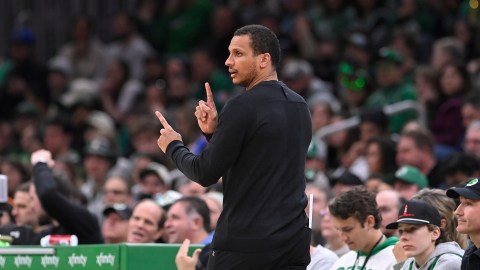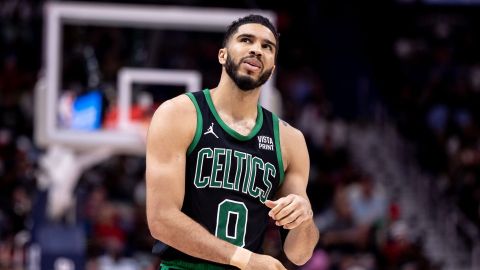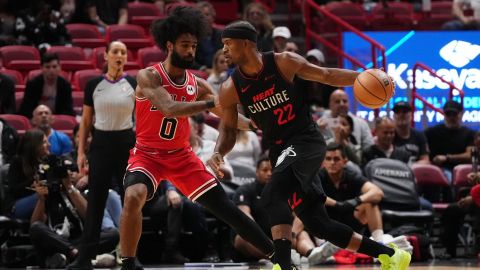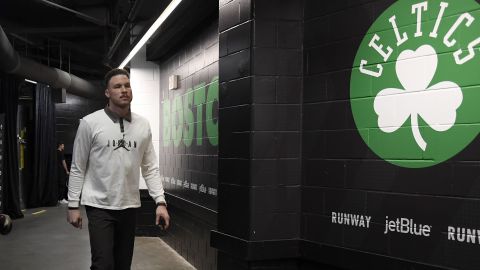 The first question many people had when news came that former Butler University coach Brad Stevens had left the Bulldogs to coach the Boston Celtics at 36 years old was this: Does Stevens have a chance to succeed in a league where so many other good college coaches have failed?
The first question many people had when news came that former Butler University coach Brad Stevens had left the Bulldogs to coach the Boston Celtics at 36 years old was this: Does Stevens have a chance to succeed in a league where so many other good college coaches have failed?
The prime example, of course, is Rick Pitino, who flamed out by record (102-146) and rhetoric when coaching Boston’s own from 1997 to 2001. Local man John Calipari didn’t do well either, and a rundown of coaches making the jump over the last 20 years is not exactly in need of quantitative analysis.
Boston writers who were around for the wreckage of Pitino will surely be able to sift through the comparisons, but the answer right now, and likely for several years, is this: No one knows.
No one knows whether Stevens will be a raving success, or whether he’ll be caught underfoot in a league with some players older than he is. No one knows whether he’ll manage the egos as effectively as he managed the overachievers who filled his Butler benches. No one knows whether the brilliance he’s shown when it comes to numbers and sets will translate into a game that at once requires more basketball and less basketball, in often-frustrating shades for newcomers.
The only thing Celtics observers can do at this point is look at what Stevens brings and know that, at some level, such a transition has never really been made before. While quite a few coaches have gone from college to the pros, rarely have any done it with such little experience or overlap with the pro game. Signing Stevens, as many have already noted, is likely to end up at one extreme or the other — either a move that will be great if he succeeds, or disappointing if he ends being a complete bust who was not prepared for the challenges.
There are several reasons to think that Stevens is projecting to succeed, though — and if not succeed in the NBA, then at least succeed by not going out Pitino-style.
First, know what Stevens brings from a strategy standpoint. He’s a level above in the part of the game that uses breakdowns and analytics to better know opponents, or at least to confirm hunches about them. His knowledge of the modern game puts him in a class with other young coaches who know not only the benefits and drawbacks of systems and sets that have been around for years, but also the possibilities that have come with enhanced data manipulation.
Stevens also has some skill when it comes to drawing up set pieces and making the most out of a possession — something he honed in the college game.
Second, Stevens comes with a load of intangibles that make handing the keys to a young, unproven coach less scary. He built a winner out of virtually nothing at Butler, and while he did it while navigating the unique landscape of college basketball, the consistency he provided is not a given. It may be a fluke to take a mid-major to a championship game once, but not twice — and especially not two years in a row, with many new players. Stevens knew how to recruit and work with what he had, and his teams never experienced big drop-offs (his record at Butler was 166-49). He’s also been lauded for creating a culture, not just a team.
A coach who builds and develops with the future in mind, rather than one game or one season at a time, is valuable — no matter the level of basketball. With Stevens already signed to a six-year deal, the Celtics have signaled that, hiccups expected, he will get a full chance to apply his philosophy to the pro game.
Finally, perhaps the greatest asset Stevens brings is his raw ability to coach players, bolstered by what has been widely described as “calm.” Stevens takes care of the details and fires up his team, but not to the point of getting in the way of the players doing what they need to do. His way of leading is providing a place for players to be their best, not making himself — or any pressures of the moment — the center of attention.
Many a college coach has been unable set his legend aside to lift a team instead. Stevens hasn’t let such a legend form.
In the NBA, where coaching is more about dealing with personalities and egos than it is imposing a certain style on a set of players, Stevens’ temperament bodes well. A coach who has never needed to be the focus is entering a game where plenty of others will want attention. That, plus Stevens’ effectiveness in getting results despite a lacking setup — from working with meager talent to competing with teams with more resources — makes him an intriguing leader for the new Celtics team that’s being crafted.
Other college coaches moving on to the NBA have been quickly burned out, quickly overcome by the pressures and politics of the new game, or quickly irritated by a system they aren’t equipped to — or don’t want to — handle. Pitino was certainly such, and he was that way from the first minute — his entrance to Boston was gaudier than his numbers would ever be.
Stevens, even for the uninitiated observer, is as anti-Pitino as they come. His coaching style is different, and so, too, will likely be his approach.
He is completely unproven as he comes to this new post — but perhaps that’s what the Celtics need most at this point: a coach competent and sure, but not one who ever feels the needs to prove himself.
Photo via Facebook/Tiro Al Blanco



